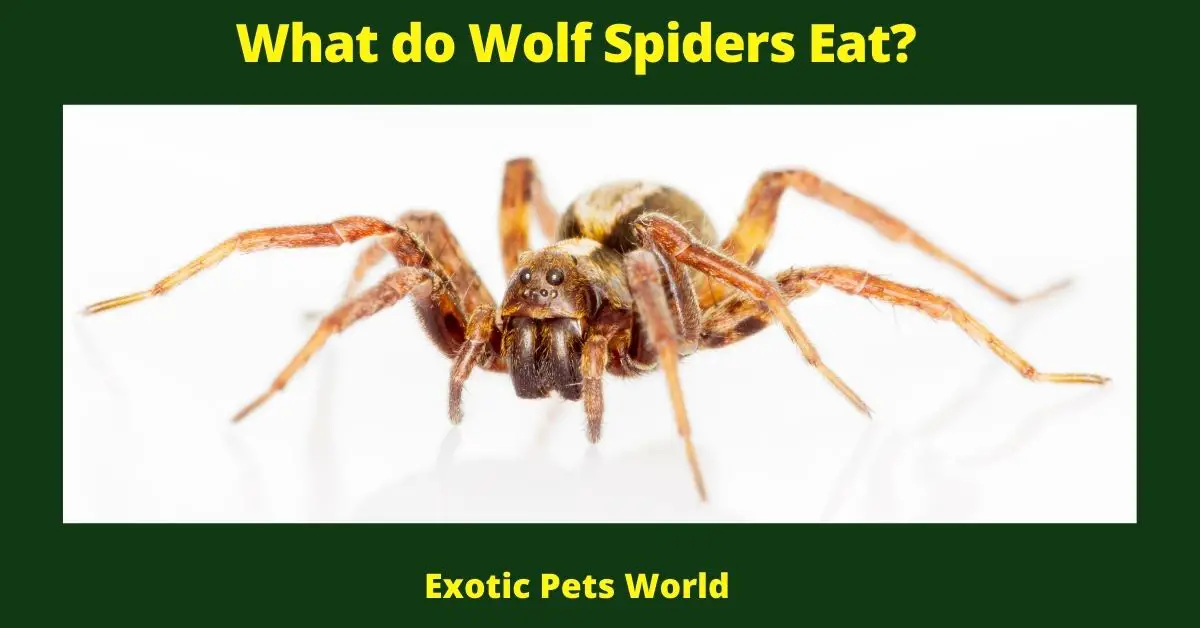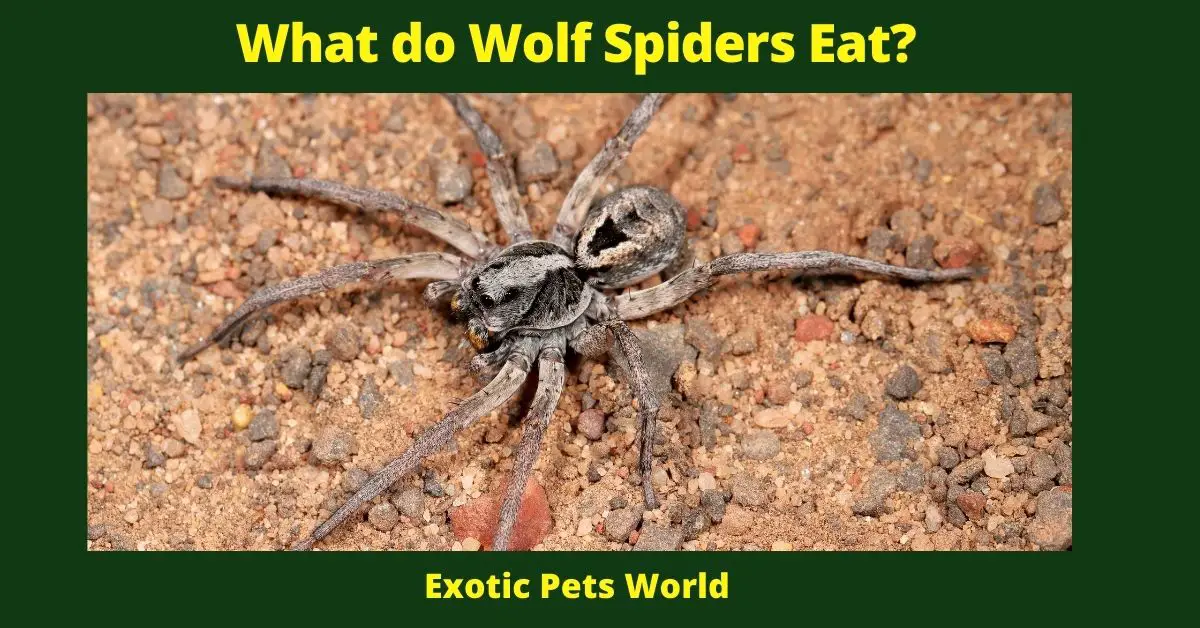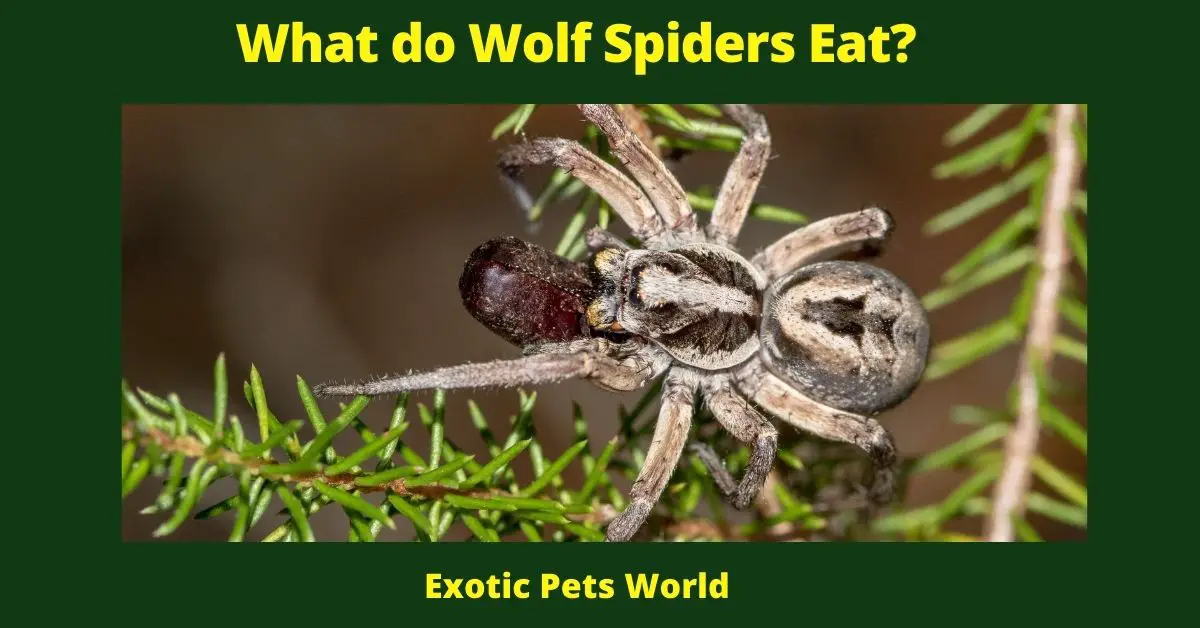Wolf spiders are carnivores and feed mainly on insects. They will eat almost any type of insect, including other spiders! Some wolf spider species have even been known to eat small lizards or frogs. Their diet changes as they grow older; younger wolf spiders tend to eat more flying insects, while adults prefer crawling prey.
What do Wolf Spiders Eat?
Wolf spiders are large and hairy, so they seem scary at first. But don’t worry: these spiders only eat other insects! These arachnids hunt for their food during the day or night, depending on where they live. They use their keen eyesight to find prey and then pounce with great speed off of a nearby object. Once captured, wolf spiders inject venom into the insect’s body that paralyzes it within minutes. The spider then proceeds to suck out its victim’s juices as if drinking from a straw! Jump to Wolf Spiders: Comprehensive Guide
Why are Wolf spiders are Generalist Predators?
Wolf spiders are called generalist predators because they prey on a variety of different animals. This includes insects, other spiders, lizards, and even small rodents.
One reason why wolf spiders are such successful predators is that they have a very wide range of hunting strategies. Some wolf spiders wait in ambush for their prey, while others actively search for food. They also use a variety of hunting techniques, such as chasing prey down, jumping on them, or using webs to trap their victims.
Wolf spiders are also able to survive in a wide range of habitats. This means they can live in both forests and deserts. This adaptability allows wolf spiders to take advantage of a wide variety of food sources.
Overall, wolf spiders are very successful predators because of their adaptability and versatility. They can prey on a wide variety of animals and live in a variety of habitats. This makes them an important part of the food web and helps keep ecosystems healthy. What do Wolf Spiders Eat?
What Do Pet Wolf Spiders Eat?
Your Pets Wolf Spiders Diet should consist of:
- Crickets – They can eat live or pre-killed crickets.
- Mealworms – They like the small mealworms and you should feed them a few about every other day.
- Roaches – I know what you thinking, but roaches are actually good for wolf spiders to eat because they have more protein than any of their staple food sources mentioned before.
- Flies – These can be live or dead, but make sure they are not too big because wolf spiders have a hard time swallowing prey that is larger than their head.
- You should also offer your Pet Wolf Spiders a safe place to catch their prey.
- A nice bark log is actually perfect for this, but any hollow item will do the trick. Just make sure it’s not too big and that you can easily remove or replace it when needed.
- Supplement Dusted Insects – If you are having trouble finding live food for your spiders, you can also provide them with dusted insects. This is a great way to ensure they are getting the proper nutrients they need.
What Wolf Spiders Eat in the Wild?
Being Hunters, Wolf Spiders Eat Insects
Wolf spiders are carnivores and feed mainly on insects. They will eat almost any type of insect, including other spiders! Some wolf spider species have even been known to eat small lizards or frogs. Their diet changes as they grow older; younger wolf spiders tend to eat more flying insects, while adults prefer crawling prey.
Wolf Spiders are Nocturnal
Most wolf spider hunting happens at night. This is when they are most active and can find their prey more easily. They typically rest during the day, hidden in a crevice or under something.

Wolf spiders have great eyesight
One of the reasons wolf spiders hunt at night is because they have very good eyesight. They can see objects up to 12 inches away, which helps them spot insects from a distance. Wolf spiders also have excellent vision in low light conditions.
They Use Webbing to Catch Prey
In addition to their sharp eyesight, wolf spiders also use webbing to capture prey. Their webs are not as complex as those of other types of spiders, but they are effective for trapping unsuspecting insects. When a bug gets caught in the web, the spider can sense it and go over to eat.
Wolf Spiders are Burrowers
Most wolf spiders spend their lives living underground. They build tunnels where they rest during the day and wait for nightfall before heading out hunting. Some species will even cover up their burrows with rocks or other debris so that nothing touches them inside while they sleep! The holes also serve as nests for their eggs once females lay them there. Females guard these tiny egg sacs until after hatching time comes around; then she goes back to her normal nocturnal activities of hunting insects at night (and building more temporary homes).
What Baby Wolf Spiders Eat?
A Mother Wolf Spider lays her eggs in a sac. After the eggs hatch, the baby spiders will eat the egg sac. Baby wolf spiders also eat other small insects. They are cannibalistic and will sometimes eat each other.
She carries them on her back until they molt and get their own webs.
They feed on very small insects like flies and crickets.
The babies will eat egg sacs if they find any, but usually, the mother eats them to give her energy for future eggs. A female wolf spider can lay up to six hundred eggs at once! The baby spiders will live on milkweed seeds until they grow big enough to catch their own food. They love bugs; insects make up 99% of their diet. When she is done with all that carrying around, the mom goes back into hiding in a hole somewhere nearby so the young ones won’t eat her too!
They begin leaving their mom at age six to eight weeks, but they often stay together on a web for another two weeks.
Are Wolf Spiders Dangerous?
Wolf Spiders are not considered dangerous to humans. They may bite if provoked, but the bites are not known to be harmful. Wolf spiders are generally timid and will run away when they encounter people. Their venom is not considered deadly to humans. However, wolf spiders can deliver a painful bite, so it is best to avoid them if possible.
They have fangs and venom but they are not deadly to us. Wolf spiders can bite if provoked but it is not harmful to humans. They tend to run away from people and generally do not come into contact with them often.
Wolf Spiders may be dangerous, or they might be a bit of a nuisance depending on the situation you encounter them in, but they aren’t known to harm humans sometimes called ‘deadly’ which means very poisonous. Generally speaking, this type of spider will only attack when provoked so it’s best just to leave them alone entirely instead of provoking an angry response from these creatures.
A wolf spider bite looks like a bee sting and feels like a hornet sting. It is not deadly to humans, but it can be quite painful. If you are bitten by a wolf spider, clean the wound with soap and water and apply ice to the area to reduce swelling. seek medical attention if the pain does not go away or if you develop other symptoms such as fever or nausea.
Can Wolf Spiders Eat Other Spiders?
Yes! Wolf spiders prey on a variety of insects and invertebrates. They eat other types of spiders including black widows, huntsman, and jumping spiders.
They attack other spiders by biting them, injecting venom which liquefies their insides. They then suck out the liquidized remains like a milkshake!
The wolf spider also eats insects and other invertebrates such as crickets, grasshoppers, worms, beetles, and large prey. The main difference between this type of spider and others is that they have eight eyes instead of six or four. This gives it better sight by having two extra eyes at the back on top of its head.

What do Wolf Spiders Drink?
Wolf spiders need moisture to survive, so they drink water just like any other animal. They may also drink from dew-covered plants or prey that is wet. Some wolf spiders can even swim!
In the wild, wolf spiders often find water sources by following their prey. When food is scarce, they’ll look for alternatives such as small ponds, puddles, or streams. If there’s no surface water available, they’ll dig down to find groundwaterWolf spiders typically avoid swimming in open water where they could be easily spotted and eaten by predators. However, if necessary, they can cross rivers and lakes by bridging the gap with their webbing. Some have even been known to travel on floating logs or debris across wide bodies of water
How Often Should You Feed a Wolf Spider?
Wolf spiders normally do not require much to eat. They are mostly nocturnal hunters that prefer small insects for their meals, and sometimes even fresh meat (including mice).
Wolf spiders like these can be fed once or twice a week, but take care not to overfeed them because they produce large amounts of webbing which could make the enclosure messy. The prey you feed your spider should also be larger than its mouth so it takes longer for him/her to finish eating. This will allow time for the venom to digest properly before he/she eats again.
Their Diet Changes during:
- Egg Laying – Females will eat more to help produce eggs.
- Molting – During this time spiders need a lot of water, so make sure they have access to some in their enclosure. If you notice your spider is having trouble shedding its skin, it might be because the humidity levels are not high enough or there isn’t enough moisture on the substrate for them to crawl around comfortably.
- After molting when they are soft-bodied and freshly sclerotized (hardened) they are very vulnerable until their exoskeleton has hardened up again through exposure to air over several hours or overnight. It’s best then not to handle them during that period as any handling could damage their new softer body which would take weeks/months before getting back into a condition similar
- Mating – Males will eat more.
- Pregnant Females – Males and females will both want to feed more than usual because of their bulking/breeding cycles, however, pregnant female wolf spiders are prone to eating the male after mating if he is not careful. Make sure they have ample food so that doesn’t happen!
- Ailing Spiders – If your spider does look like it may be sick or injured you should try increasing its water intake by misting lightly with a spray bottle once per day for two minutes each time (make sure there’s no standing water left in the enclosure afterward). You can also offer freshly killed insects as an easy meal during this period which sometimes helps them regain some energy back from illness without having to expend too much effort hunting for prey
Final Thoughts – What do Wolf Spiders Eat?
So in conclusion, Wolf Spiders generally aren’t considered dangerous to us however they may deliver a painful bite if provoked so it’s best just to leave them alone. Clean any bites with soap and water and apply ice packs for swelling relief; if it doesn’t go away or you have other concerning symptoms seek professional help just to be safe!

I don’t think the title of your article matches the content lol. Just kidding, mainly because I had some doubts after reading the article.